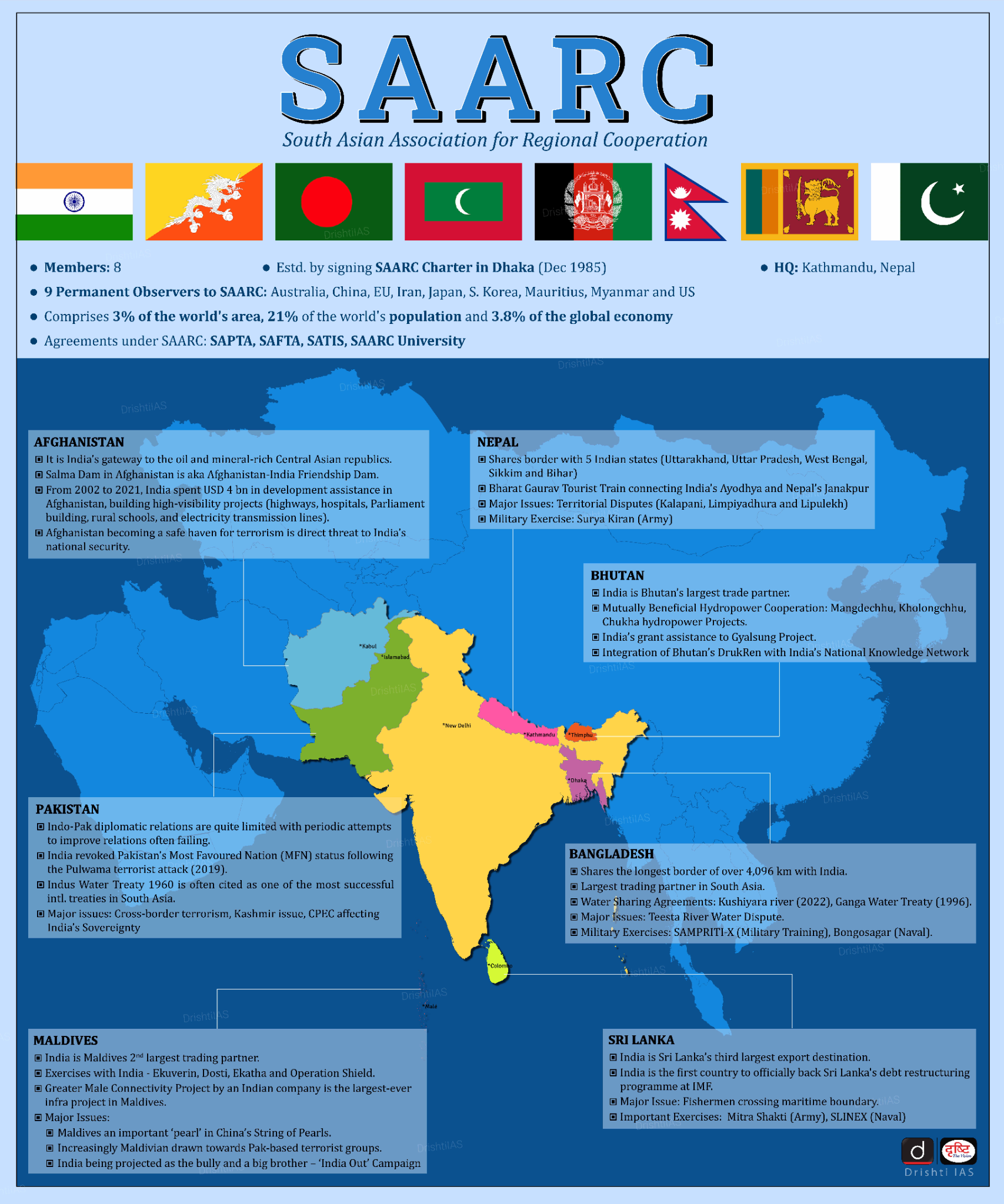SAARC Visa Exemption Scheme | 24 Apr 2025
Why in News?
The Cabinet Committee on Security (CCS) has revoked the South Asian Association for Regional Cooperation (SAARC) Visa Exemption Scheme (SVES) for Pakistani nationals following the Pahalgam terror attack.
- This marks a firm diplomatic response to Pakistan’s continued support for cross-border terrorism.
What is the SAARC Visa Exemption Scheme?
- SVES: Launched in 1992, based on the decision of the 4th SAARC Summit in 1988 held in Islamabad. It is designed to facilitate people-to-people contact and regional cooperation among SAARC nations.
- Purpose: It permits select individuals from member countries to travel without a visa using a Special Travel Document.
- It covers 24 categories, including dignitaries, judges, parliamentarians, officials, businesspersons, journalists, and sportspersons.
- Validity: Visa Stickers are issued by each SAARC member state to eligible individuals from their country, typically valid for one year and reviewed regularly by immigration authorities.
- India Specific Provisions: Citizens of Nepal and Bhutan do not need a visa to enter India. For Pakistani nationals, only select categories were eligible for a multiple-entry Business Visa—initially valid for one year and limited to 10 locations.
- In 2015, India revised the rules, allowing special-category Pakistani businessmen a multiple-entry visa valid for up to three years, restricted to 15 designated places.
- Among SAARC countries, Sri Lankan nationals were eligible for the e-Tourist Visa facility.
- Indian nationals do not need a visa to visit Nepal and Bhutan, while other SAARC countries offer Business Visa facilities to Indian citizens.
- India’s Revocation of SVES for Pakistan: The CCS notified that all SAARC Visa Exemption Scheme (SVES) visas issued to Pakistani nationals are now void, and those currently in India under this scheme must leave the country
Note: India signed an agreement with Pakistan in 2019, outlining the modalities for operationalizing the Shri Kartarpur Sahib Corridor, which allowed visa-free pilgrimage for Indian Sikhs to Gurdwara Darbar Sahib in Pakistan.
Cabinet Committee on Security (CCS)
- CCS headed by the Prime Minister, it includes ministers from Finance, Defence, Home Affairs, and External Affairs. Other members may include defence chiefs and senior bureaucrats.
- It plays a pivotal role in India’s national security framework, dealing with critical matters related to defense, law and order, and foreign affairs.
- CCS was first convened during the Indo-Pak War of 1947–48, chaired by then Prime Minister Jawaharlal Nehru. After the 1999 Kargil War, it adopted a formal structure, becoming India's apex decision-making body for defense and national security.
- The CCS has met during critical events like the 1971 India-Pakistan War and the 1999 IC 814 hijack (Kandahar hijack)
| Read more: Pahalgam Terror Attack and Suspension of the Indus Waters Treaty |
UPSC Civil Services Examination, Previous Year Questions (PYQs)
Mains:
Q. “Increasing cross-border terrorist attacks in India and growing interference in the internal affairs of several member-states by Pakistan are not conducive for the future of SAARC (South Asian Association for Regional Cooperation).” Explain with suitable examples. (2016)

